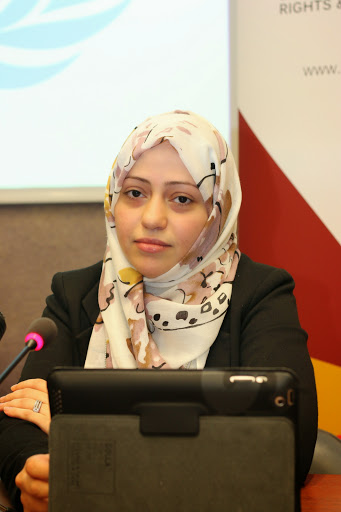13 March 2015
In honor of International Women’s Day and its slogan, “Empowerment of Women – Empowerment of Humanitarians: Let’s imagine together!”, and in light of the 28th session of the United Nations Human Rights Council that began on 2 March 2015, the European Saudi Organization for Human Rights (ESOHR) and Americans for Democracy & Human Rights in Bahrain (ADHRB) express concern over the systematic violation of women’s rights by the Government of Saudi Arabia.
On 2 December 2014, the Saudi government arbitrarily imposed a travel ban on human rights defender Samar Badawi just two days before she would have arrived at the 16th EU-NGO Human Rights Forum in Brussels, Belgium. This ban is a clear violation of Saudi law, which states that: “no person may be barred from traveling except by a judicial ruling or a decision issued by the Minister of the Interior for specific reasons relating to security and for a specific period of time. In both cases, the person barred from traveling shall be notified within a period not exceeding one week from the date of issuance of said ruling or decision.” The travel ban on Ms. Badawi was issued by the Minister of Interior, but it was accompanied by neither the specific security reason nor the specific period of time mandated by law.
We believe this arbitrary ban was issued precisely because of Samar Badawi’s human rights activities, in particular her participation at the 27th session of the UNHRC in September 2014. During that session, Ms. Badawi called for the release of her detained husband, human rights defender Waleed Abu al-Khair, as well as for the release of other political prisoners.
Saudi Arabia’s travel ban on Ms. Badawi is an affront to both its commitments as a party to the Convention on the Elimination of All Forms of Discrimination against Women (CEDAW) as well as its status as an elected member of the Human Rights Council (2014 – 2016). Moreover, this ban is in clear violation of the 37 recommendations on the rights of women and children that the Saudi government pledged to implement at its Universal Periodic Review (UPR) session in October 2013. As stated at the onset of the 28th session of the UNHRC on 2 March 2015, “the government agencies in relation were assigned to implement the recommendations endorsed by the United Kingdom within the second round of the UPR.” The Saudi government has blatantly refused to abide by these commitments.
This egregious violation of women’s rights is not limited to those abuses perpetrated against Ms. Badawi. On 26 February 2015, Mrs. Bahiya al-Rashudi was sentenced to 10 months in prison after she was arrested for demanding the release of detainees. Two other women, Lujain al-Hathloul and Maysa al-Amoudi, were arrested simply for driving a car. Before their release for unknown reasons on 12 February 2015, their trial was in the process of being transferred to the Specialized Criminal Court. That court is almost exclusively used to try suspected terrorists. In another instance, Mrs. Suad al-Shammari was arrested for defending human rights on social media. Mrs. al-Shammari, detained on 28 October 2014, and was not released until 29 January 2015. The court only released her after placing restrictions on her freedom of expression and general activity. Systematically, the Saudi government is arresting, investigating, and detaining activists in order to suppress dissent and constrain political freedom.
Saudi Arabia needs to honor its commitments. So long as the travel ban on Ms. Badawi stands, it stands as proof that the Saudi government cannot be trusted to promote or protect human rights.
To coincide with International Women’s Day and with the 28th session of the UNHRC, and in accordance with the treaties and recommendations that Saudi Arabia has accepted, both the ESOHR and ADHRB urge the Saudi government to lift the travel ban on Ms. Samar Badawi and to cease and desist all associated harassment.
We also call upon the UN High Commissioner for Human Rights to review these violations against Ms. Samar Badawi, as preventing her from traveling due to her participation in the UNHRC indicates a clear lack of respect for the institution of which Saudi Arabia is an elected member. Furthermore, it indicates the will of the Saudi government to prevent human rights activists from engaging in any substantive interaction with UNHRC. This behavior is evidence of Saudi Arabia’s refusal to properly recognize civil and political freedoms, issues of central importance to the High Commissioner.
Finally, we wish to reemphasize the 5 December 2014 EU request made to the Government of Saudi Arabia. The government must clarify the reasons behind any prohibition of travel, thus ultimately lifting this arbitrary ban on Ms. Samar Badawi.
الرجاء الضغط هنا لقراءة هذا البيان باللغة العربية





